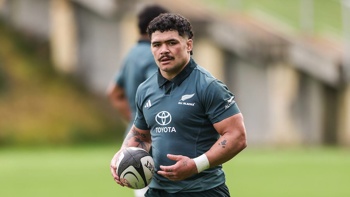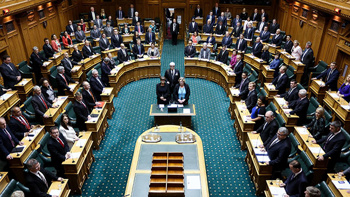As a child in the East African country of Eritrea, Ibrahim Omer wanted to be either a football player or a politician.
But when dictatorship took hold of his once tolerant country and he saw how politicians could ruin people's lives he gave up on becoming one.
"I vividly remember the fighting. There was no power, there was very little food, the city was surrounded by the fighters for many, many months."
In his maiden speech to Parliament, Omer detailed his perilous journey from fleeing Eritrea to becoming a Member of Parliament and New Zealand's first African MP.
Omer said he was drafted to Eritrea's national service as a high school student and suffered extreme hardships for what was supposed to be 18 months - but in reality it was indefinite.
He decided to leave behind everything he loved and fled to neighbouring Sudan across a border which had a shoot-to-kill policy for deserters, preferring the option to die trying rather than die a slow death.
Omer made it to a United Nations camp where he stayed for five years before coming to New Zealand.
"I had never heard of this place, if I'm honest. But an immigration officer told me it was one of the most peaceful places in the world.
"That was good enough for me because I was sick and tired of looking over my shoulder."
Omer picked up minimum-wage jobs, sometimes working more than 80 hours a week to pay the bills and sent money to his family back home. One job was as a security guard before he was attacked and beaten in the middle of the night.
/cloudfront-ap-southeast-2.images.arcpublishing.com/nzme/5EYSEQMORDGXZRFBVG6AASMQ5M.jpg?width=720&height=494&mode=max)
Labour list MP Ibraham Omer receiving a hug from Prime Minister Jacinda Ardern after his maiden speech. Photo / Mark Mitchell
He became a cleaner and worked day and night, sacrificing having a life and being part of his community, he said.
Omer became involved in the Living Wage Movement through his union and got a pay rise which meant he could go to Victoria University to study politics and international relations.
On the Sunday night before his first lecture, he cleaned the theatre he would soon be sitting in as a student.
After studying, he became an E Tū union organiser and this year entered Parliament as number 41 on Labour's list.
In his speech, Omer promised to represent the New Zealanders who are struggling on low wages.
"They work hard, they work very long hours and yet they still struggle to provide three meals for their kids."
Omer said he wanted to see every worker be able to live their lives with dignity.
"I'm a son, brother, a friend, I'm a Muslim, I'm a former refugee, I'm a trade unionist and living wage activist."
Omer had a raucous standing ovation after his speech, including from his friend and Deputy Prime Minister Grant Robertson, who sat in the seat in front of him as he spoke to the House.
Arena Williams
Arena Williams ran out of breath rattling off the names of the more than 50 people who came to watch her maiden speech as a Member of Parliament.
Among them were her husband, two young sons and her father, Haare Williams.
"He's in his late 80's or early 90's - we're not quite sure. He's never had a birth certificate.
"Dad was not a poor kid, because that suggests he didn't have enough money to get by. In fact he had no money - never handled it, never had a reason to see it.
/cloudfront-ap-southeast-2.images.arcpublishing.com/nzme/EGIET4F36Z4WNX6XB2SGDUX32I.jpg?width=662&height=446&mode=max)
Labour MP for Manurewa Arena Williams during her maiden speech in Parliament. Photo / Mark Mitchell
"He was raised by his Māori-speaking grandparents on the shores of the Ohiwa Harbour in a raupo whare with a dirt floor, where they were kaitiaki of a holy place for Te Kooti and the Haahi Ringatu."
Williams' father became a teacher then a broadcaster and taught his daughter there was "dignity in humility" and that dignity was the most fundamental of all rights, she said.
"He also taught me that a change of opinion isn't a sign of intellectual weakness, and how to make peace from conflict.
"It's his skill of practical peacemaking that I want to bring to my politics."
Williams, who was elected as the MP for Manurewa after Louisa Wall opted to only run on the list, first joined the Labour Party as a teenager out of frustration over Helen Clark's actions on the seabed and foreshore issue.
She wanted to change the decisions from the inside.
Williams said she'd been inspired by senior Labour MP Nanaia Mahuta since she was trailblazing for wahine Māori, and Prime Minister Jacinda Ardern for shifting the goalposts on factoring kindness into policy.
Williams thanked her husband, Max Hardy, and said she would grieve a little for missing out on as much time with her young sons.
"They will no longer have a mum who is at every playdate and rocks them to sleep. I hope when they're older they'll understand that there were other kids in Manurewa who also needed me to look after them.
"Kids with rotting teeth in one of the wealthiest countries in the world. Kids without warm, dry homes. Kids I meet in schools whose eyes light up when they meet a politician who looks and talks like them."
Take your Radio, Podcasts and Music with you









